- Clone
- W16220A (See other available formats)
- Regulatory Status
- RUO
- Other Names
- Vim, CTRCT30, HEL 113, Epididymis Luminal Protein 113
- Isotype
- Rat IgG2a, κ
- Ave. Rating
- Submit a Review
- Product Citations
- publications
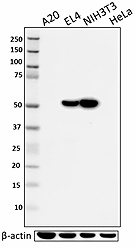
-

Total cell lysate (15 µg protein) from A20 (negative control), EL4, NIH3T3 and HeLa cells were resolved by electrophoresis (4-12% Bis-Tris gel), transferred to nitrocellulose, and probed with 1: 500 (1 µg/mL) diluted purified anti-Vimentin antibody (clone W16220A). Proteins were visualized by chemiluminescence detection using 1:3000 diluted HRP rat-IgG secondary antibody conjugated to HRP (upper). 1:2000 dilution of Direct-Blot™ HRP anti-β-actin antibody (clone 2F1-1) was used as a loading control (lower). Lane M: Molecular weight ladder. -

NIH3T3 cells were fixed with 4% paraformaldehyde (PFA) for 15 minutes, permeabilized with 0.5% Triton X-100 for 3 minutes, and blocked with 5% FBS for 60 minutes. Then the cells were intracellularly stained with 1:1000 (0.5 µg/mL) anti-Vimentin (clone W16220A) overnight at 4 degrees followed by Alexa Fluor® 594 (red) conjugated goat anti-rat IgG incubation for one hour at room temperature. Nuclei were counterstained with DAPI (blue). The image was captured with a 60X objective. For negative control and titration data, refer to the supplemental data. -

A20 cells (negative control, open histogram) or EL-4 cells (positive control, filled histogram) were fixed and permeabilized using True-Phos™ Perm buffer (Cat. No. 425401) and intracellularly stained with purified anti-Vimentin (clone W16220A), or purified Rat IgG2a, κ isotype control (open histogram, dashed line) (representative histogram for both cell lines) (Cat. No. 400501), followed by Alexa Fluor™ 647 goat anti-Rat IgG (Cat. No. 405416).
| Cat # | Size | Price | Quantity Check Availability | Save | ||
|---|---|---|---|---|---|---|
| 699301 | 25 µg | 81€ | ||||
| 699302 | 100 µg | 203€ | ||||
Vimentin are class-III intermediate filaments found in various non-epithelial cells, especially mesenchymal cells. Vimentin is a widely expressed and highly conserved 54 kD protein that is constitutively expressed in mesenchymal cells, endothelial cells lining blood vessels, renal tubular cells, macrophages, neutrophils, fibroblasts, and leukocytes1,2. Vimentin is used as a marker of mesenchymal cells to distinguish them from epithelial cells3. Increased vimentin expression is frequently used as an EMT marker in cancer4. Autoantibodies to vimentin are commonly found in patients with autoimmune diseases such as Lupus5 and rheumatoid arthritis6, and also found after transplantation7.
Product DetailsProduct Details
- Verified Reactivity
- Mouse
- Antibody Type
- Monoclonal
- Host Species
- Rat
- Immunogen
- Partial mouse Vimentin (224-446 a.a.) recombinant protein expressed in E. coli.
- Formulation
- Phosphate-buffered solution, pH 7.2, containing 0.09% sodium azide.
- Preparation
- The antibody was purified by affinity chromatography.
- Concentration
- 0.5 mg/mL
- Storage & Handling
- The antibody solution should be stored undiluted between 2°C and 8°C.
- Application
-
WB - Quality tested
ICC, ICFC - Verified - Recommended Usage
-
Each lot of this antibody is quality control tested by Western blotting. For Western blotting, the suggested use of this reagent is 1: 500-1:5000 diluted (0.1 - 1 µg/mL). For immunocytochemistry, the suggested use of this reagent is 1:250-1:2500 diluted (0.2 - 2 µg/mL). For intracellular flow cytometric staining, the suggested use of this reagent is ≤ 0.5 µg per million cells in 100 µL volume. It is recommended that the reagent be titrated for optimal performance for each application.
- Application Notes
-
This antibody does not cross-react with human (in-house tested).
May be weakly reactive with human Vimentin by WB. - Product Citations
-
- RRID
-
AB_2716136 (BioLegend Cat. No. 699301)
AB_2716137 (BioLegend Cat. No. 699302)
Antigen Details
- Structure
- 466 amino acids with a predicted molecular weight of 54 kD.
- Distribution
-
Cytoplasm.
- Function
- Vimentins are class-III intermediate filaments found in various non-epithelial cells, especially mesenchymal cells. Vimentin is attached to the nucleus, endoplasmic reticulum, and mitochondria, either laterally or terminally.
- Interaction
- HCV core protein, LGSN, SYNM, PLEC, SLC6A4, STK33, LARP6, RAB8B, TOR1A, TOR1AIP1, and BCAS3.
- Biology Area
- Cell Biology, Cell Motility/Cytoskeleton/Structure, Neuroscience, Neuroscience Cell Markers
- Molecular Family
- Intermediate Filaments
- Antigen References
-
1. Kidd ME, et al. 2014. Am J Respir Cell Mol Biol. 50:1.
2. Fuchs E, et al. 1994. Annu Rev Biochem. 63:345.
3. Zeisberg M, et al. 2009. J Clin Invest. 119:1429.
4. Scanlon CS, et al. 2013. J Dent Res. 92:114.
5. Thebault S, et al. 2002. J Immunol. 169:4046.
6. Vossenaar ER, et al. 2004. Arthritis Res Ther. 6:R142.
7. Rose ML. 2013. Hum Immunol. 74:1459. - Gene ID
- 22352 View all products for this Gene ID
- UniProt
- View information about Vimentin on UniProt.org
Related FAQs
Other Formats
View All Vimentin Reagents Request Custom Conjugation| Description | Clone | Applications |
|---|---|---|
| Purified anti-Vimentin | W16220A | WB,ICC,ICFC |
| Alexa Fluor® 594 anti-Vimentin | W16220A | ICC |
| Alexa Fluor® 488 anti-Vimentin Antibody | W16220A | ICC,ICFC |
| Alexa Fluor® 647 anti-Vimentin | W16220A | ICC,ICFC,SB |
| PE anti-Vimentin | W16220A | ICFC |
Customers Also Purchased
Compare Data Across All Formats
This data display is provided for general comparisons between formats.
Your actual data may vary due to variations in samples, target cells, instruments and their settings, staining conditions, and other factors.
If you need assistance with selecting the best format contact our expert technical support team.
-
Purified anti-Vimentin
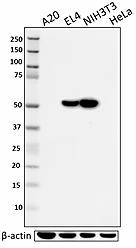
Total cell lysate (15 µg protein) from A20 (negative control... 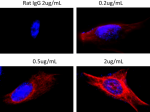
NIH3T3 cells were fixed with 4% paraformaldehyde (PFA) for ... 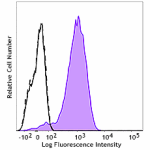
A20 cells (negative control, open histogram) or EL-4 cells (... -
Alexa Fluor® 594 anti-Vimentin

NIH3T3 cells were fixed with 4% paraformaldehyde (PFA) for 1... -
Alexa Fluor® 488 anti-Vimentin Antibody

NIH/3T3 cells were fixed with 4% paraformaldehyde for 10 min... 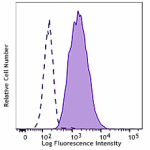
EL4 cells (filled histogram, positive control) and A20 cells... -
Alexa Fluor® 647 anti-Vimentin

NIH/3T3 cells were fixed with 4% paraformaldehyde for 10 min... 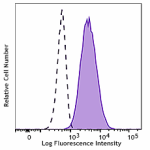
EL-4 cells (positive target) were fixed with fixation buffer... 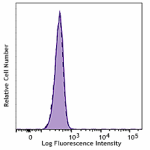
A20 cells (negative target) were fixed with fixation buffer ... -
PE anti-Vimentin
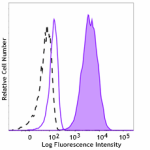
EL4 cells (positive control) (filled histogram) and A20 cell...
 Login / Register
Login / Register 




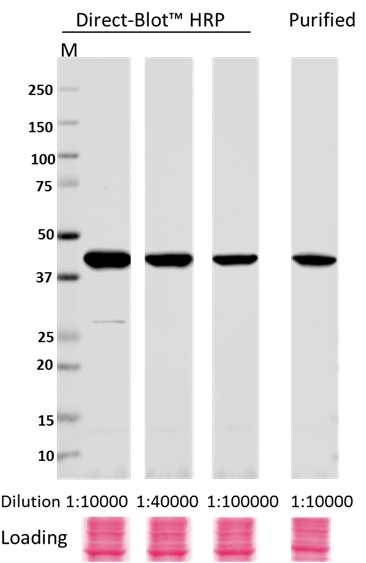
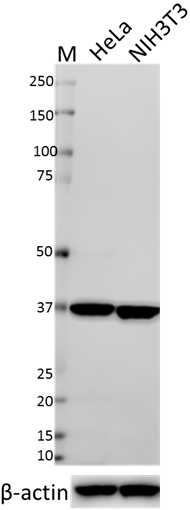
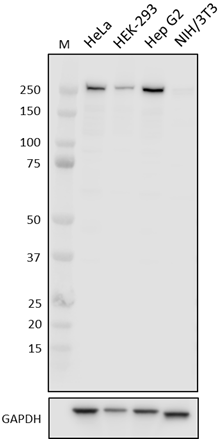
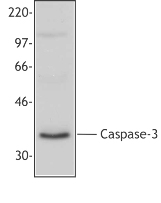



Follow Us